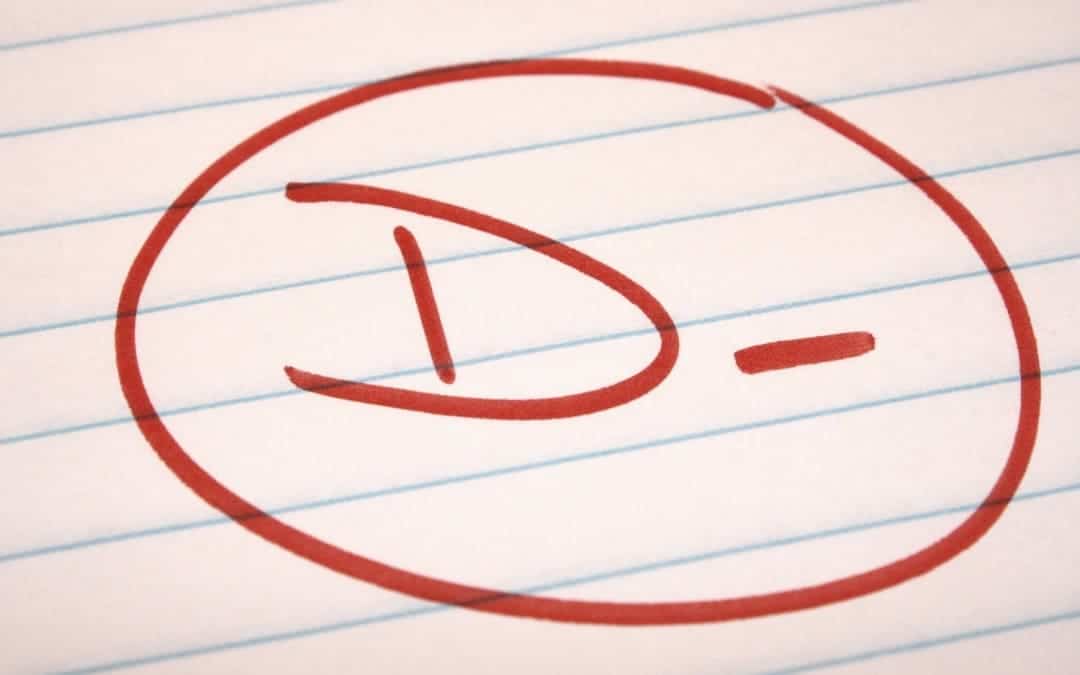High School can be pretty challenging, academically and socially, and not every student emerges from high school with straight A’s. If you’re a student who’s getting bad grades, here’s some advice for the college admissions process. Don’t be discouraged: with some perseverance and determination, college is within your reach!
If you’re struggling with the pressures of High School right now, please check out our Ultimate Time Management for Teens and Students course (and book), which we created specifically to help teens and parents figure out the INSANE challenges of high school and college readiness. Check it out here!
Take Responsibility for Your Grades
Don’t attempt to shift the blame to teachers, parents, extracurricular activities, or friends. Juggling myriad responsibilities is part of student life—and it only gets more difficult in college. If dyslexia or ADD are part of the problem, make sure you’re doing everything you can to mitigate the problem, and address these issues with your current teachers and with the colleges to which you’re applying.
Colleges and universities are aware that grades are not the only indicators of success—but still, if you’ve gotten bad grades in high school, it’s wise for you to address those grades and offer an explanation for them in your college application essay or in an in-person interview. You’ve got to go beyond merely mentioning them, though. You’ve got to describe your situation in detail, show an understanding of the underlying factors at play, and offer assurances that you’re implementing specific strategies to improve your grades.
Explain the Situation to Your Recommenders
In addition to describing the reasons for your bad grades and offering assurances that you’re going to improve, it can be very helpful to develop a rapport with teachers and counselors who will write your letters of recommendation. You want to ensure that these people understand and empathize with your situation—so think critically about how to approach them with the situation. Even teachers who are giving you bad grades can be forgiving if they see that you genuinely understand your situation and are seeking to improve. Letters of recommendation attest to your character as well as to your academic abilities, so be certain your recommenders’ assessment of your character is flattering.
Apply Regular Decision
Early admission is difficult—do your best to get the best grades of your high school career during your senior year and apply to college under the normal Regular Decision timeline. A strong showing in the fall of your senior year can demonstrate to the admissions committee that you’ve got things under control and are back on track. This can also give you more time to win scholarships and financial aid, which may play into your ultimate college decisions.
Check in with your teachers often during this time. The more questions you ask, the more it shows that you’re dedicated to improving your academic performance. Explain to your teachers that you’re trying to finish strong academically. Ask them for their advice on how you can achieve that.
Consider Tutoring
If you’re lagging behind in a class despite all your best efforts, motivation may not be the issue. You may benefit from getting extra help from an older student or tutor. Teachers don’t have time to give individual attention to every student. Tutors do. Seek out people who excel in the fields where you struggle and ask them to tutor you.
Start at Community College
If you don’t end up getting into your first- or second-choice college or university, consider attending community college for a year. If you perform very well, you may be a competitive candidate for admission should you seek to transfer to a four-year college. There’s no shame in community college—quite the opposite, in the fact. You’re subjecting yourself to the rigors of collegiate life, testing yourself, seeing if you’re ready for a four-year school.
No matter what, know that you are more than just your grades. As long as you’re working hard and taking responsibility for yourself, you should be proud of who you are and where you are in the process. Believe it or not, many people don’t take the traditional pathway to college. There are always other paths—and it’s your job to make them. You can do it!
If you’re trying to find more time and guidance on how to reach your goals and find fulfillment, success, and happiness in life – starting in high school – make sure you know all about our Ultimate Time Management online course and book for teens, parents, and high school students. Check it out here.
* * *
For more college application tips, as well as SAT and ACT tips and test prep advice, join our mailing list! Looking for SAT or ACT group classes or 1-on-1 tutoring? Contact us today!
Online Courses:
Ultimate Time Management for Teens and Students
Winning College Scholarships for High Schoolers
